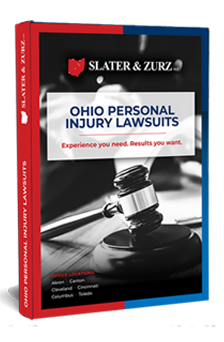Our Columbus car accident lawyers at Slater & Zurz, offer over 32 years of experience handling injury cases in Ohio. At the law firm of Slater & Zurz LLP, our car accident lawyers handle injuries and wrongful death cases for people in Columbus, Ohio. Established in 1991, we have built a successful record, recovering millions of dollars in verdicts and settlements for our clients. Our commitment has been and always will be, to meet the needs of our clients by striving for the best possible outcome in their case.
As experienced auto accident lawyers, our dedicated legal team can help you get the medical treatment you need, file an injury claim, and get the maximum compensation. We handle every aspect of the injury claims process from start to finish so you can focus on recovering and getting your life back on track.
Our top priority is to be there when you need us most and boldly advocate on your behalf to hold the at-fault party accountable for their actions and get you the much-needed compensation you are entitled to. Distracted driving remains a leading cause of car accidents in Columbus and beyond. At Slater & Zurz, we’re committed to raising awareness about the dangers of distracted driving while providing robust legal support to those affected by such negligence.
motor vehicle accidents in Columbus, Ohio
Any car crash can result in serious injuries, whether a low-speed rear-end collision or a multi-car pileup. Our car accident attorneys at the Slater & Zurz, law firm are ready to help car accident victims recover compensation for injuries sustained in an auto accident.
Seven Steps to Take After a Car Accident
You were just involved in a car accident. You are likely in shock and unsure of what to do next. Following any accident, including those that seem minor at the moment, it’s crucial to take certain steps to protect yourself and your future claim. Whether it’s a fender-bender or a more severe collision, these seven steps can be your guide to navigating the aftermath with confidence. It is important to remain calm and take the following seven steps:
- Get medical attention immediately – If you haven’t seen a doctor, do so now. Serious injuries often have delayed symptoms. That is why you need a comprehensive medical exam to identify and treat any injuries. Be sure to follow the doctor’s treatment plan and keep all of your medical bills and records. If you do not have insurance, our firm will work with you to get you the medical care you need.
- Call 911 – Report the accident to the police and obtain the officer’s traffic collision report for your records.
- Document what happened – Write down everything you can remember – what happened before, during, and after the accident. Even if it seems like a small detail to you, it may be essential in proving your claim.
- Take photographs and video of the accident scene, your injuries, and all vehicles involved in the crash – Photos and video footage are crucial in proving who was at fault, the nature and severity of your injuries, and the extent of the damage caused to your vehicle.
- Get the contact and insurance information from every driver involved in the accident – Write down the name, address, phone number, driver’s license number, insurance company, and policy number of each driver. Also, look for any eyewitnesses, and be sure to get their names and phone numbers so your attorney can speak with them later.
- Don’t speak with the insurance company – You might think you should call your insurance company or the other party’s insurance company immediately. But portions of what you say may be used against you in an attempt to deny you the compensation you deserve. If an insurance company contacts you, kindly inform them that your attorney will contact them shortly.
- Hire a qualified Columbus car accident attorney – To protect your rights and maximize your chances of obtaining full and fair compensation, contact our experienced and diligent accident lawyers in Columbus, Ohio.
What Damages Can I Recover in My Car Accident Claim?
If you have been injured due to someone’s negligent actions, you have a right to compensation for your losses. Depending on the circumstances of your case, you may be able to receive damages for:
- Medical expenses
- The costs of your vehicle repair or replacement
- Lost wages
- Property damages
- The loss of future earning capacity
- Rehabilitation treatment, including physical therapy and occupational therapy
- Future medical care and treatment
- Pain and suffering
- Emotional trauma
- Compensation for impairment, disability, and disfigurement
- Loss of consortium
In cases where a motor vehicle accident leads to a permanent injury, impacting your quality of life and ability to work, our attorneys are dedicated to ensuring that you receive compensation not only for your current medical expenses but for the ongoing care and support you may require.
In severe cases, punitive damages may also be available to you. Punitive damages are typically awarded when the at-fault party was grossly negligent or acted intentionally.
Partially At-Fault Parties Can Still Pursue Damages in Ohio
Ohio courts follow a shared negligence model, “modified comparative fault.” This means that injured victims can still pursue compensation for their damages if they are found to be 50% or less at fault for the accident. However, their final settlement amount will be reduced by their percentage of fault. For instance, if you were awarded $100,000 in damages but were found to be 25% at fault, your final compensation would be $75,000.
How our Columbus Car Accident Attorneys Can Help
It can be both frustrating and stressful to suffer serious injuries through no fault of your own. Fortunately, you do not have to go through this alone. We are here to help you every step of the way by:
- We provide you with a free, no-obligation consultation to answer any questions you have and provide you with honest, knowledgeable feedback
- Ensuring you receive the medical care you need to recover from your injuries.
- We keep you informed of any developments in your case and are readily available to address any questions or concerns you may have throughout the process.
- Handling all communication with the at-fault party, their insurance company, or attorneys on your behalf
- Working with our experienced legal team to prove who is at fault and show your injuries’ true nature and extent.
- Skillfully negotiating to get you the maximum possible compensation for your injuries.
- If negotiations are unsuccessful, file a lawsuit and skillfully advocate on your behalf at trial.
- We will be there for you and your family as long as you need us, even after your case is resolved.
Need to discuss an injury claim post-car accident? Contact the seasoned Columbus car accident attorneys at the Slater & Zurz law firm, for a free consultation. You can reach our trusted legal team at (614)756-2714 or fill out our simple online form.
Personal Injury Lawsuit Guide



